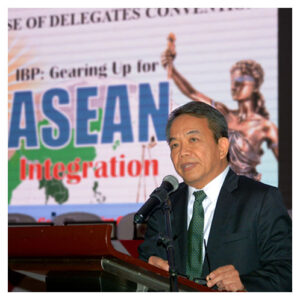
PDRC Secretary General Roberto N. Dio discussed how the Philippines can become a center of excellence in international arbitration at the ASEAN Integration Seminar and Workshop held on January 30, 2016 at the recently concluded 22nd House of Delegates Convention of the Integrated Bar of the Philippines in General Santos City.
Mr. Dio began with the basics of commercial arbitration: what arbitration is and is not. He then discussed the Philippine experience in arbitration, noting the low referral of disputes to arbitration despite the fact that the Philippines was the first in Asia to pass a law on arbitration in 1950 through the New Civil Code and in 1953 with the enactment of the Arbitration law.
He attributed the low utilization of arbitration in the Philippines to (1) a poor legal framework; (2) lack of familiarity with arbitration; (3) lack of trained and experienced arbitrators; (4) bias for litigation; (5) judicial review; (6) interventionist courts; and (7) lack of expertise in commercial and technical disputes.
He proposed the adoption of new laws and policies that favor arbitration to make the Philippines a preferred venue for international commercial arbitration. These were: (1) creation of special ADR courts; (2) setting up an ADR registry of disputes or matters referred to arbitration and other forms of ADR; (3) tax incentives to contracts with ADR clauses; (4) tax incentives to ADR practitioners; (5) budgetary support to the Office for Alternative Dispute Resolution, an agency under the Department of Justice; (6) training of ADR practitioners; and (7) development of expertise in commercial and technical arbitration.
Other invited speakers during the convention were Ms. Ma. Cecilia A. Deodores-Labadan of the National Economic Development Authority, who gave an overview of the ASEAN Economic Community; former law dean Merlin M. Magallona, who spoke on preparing lawyers for ASEAN integration; Edmund J. Kronenburg, managing partner of Braddell Bros. LLP Singapore, who shared his insights on the evolving practice of law in Singapore and other countries; and University of Santo Tomas law dean Nilo T. Divina, who discussed how to prepare law students for law practice in the ASEAN.
Enforcement Of Arbitral Awards In India
PART 2
Note: Part 1 discussed the dif ficulty of enfocring foreign arbitral awards in India before September 7, 2012. Part 2 discusses the changes in Indian arbitration law since then.
Indian courts will no longer set aside foreign awards if the arbitration agreements was executed after September 6, 2012
The landmark decision of Bharat Aluminium changed the landscape for all disputes governed by an arbitration agreement executed after September 6, 2012.
 In Bharat Aluminium, the parties executed an agreement which was governed by the laws of India as substantive law and the laws of England as arbitration law. The place of arbitration was agreed to be London, England. The arbitral tribunal made two awards dated November 10 and 12, 2002.
In Bharat Aluminium, the parties executed an agreement which was governed by the laws of India as substantive law and the laws of England as arbitration law. The place of arbitration was agreed to be London, England. The arbitral tribunal made two awards dated November 10 and 12, 2002.
Bharat Aluminium filed applications under Section 34 of the Arbitration Act 1996 to set aside both awards. The District Judge in Bilaspur as well as the Chattisgarh High Court held that the applications against the two foreign awards were not maintainable and dismissed. One judge of a two Judge Bench of the Supreme Court had reservations on the correctness of the Supreme Court’s judgments in Bhatia International and Venture Global. By order of November 1, 2011, a three Judge Bench directed the matters to be placed before the Constitution Bench.
The Constitution Bench of five judges analyzed the text of the Arbitration Act 1996 with reference to its legislative history and international conventions ratified by India, taking due notice of the stated objects and reasons for the enactment of the Act. It held that its decision in Bhatia International cannot be supported “by either the text or context of Section 1 (2) and proviso thereto”. In distinction to the Bhatia International court, the Supreme Court was unable to discern any anomaly, or any inconsistency between Section 1 and Section 2 (2).
The Supreme Court held “that Parliament by limiting the applicability of Part I to arbitrations which take place in India has expressed a legislative declaration. It has clearly given recognition to the territorial principle. Necessarily therefore, it has enacted that Part I of the Arbitration Act 1996 applies to arbitrations having their place/seat in India.” The Supreme Court reasoned that it is unable to support the conclusion reached in Bhatia International and Venture Global Engineering, that Part I would also apply to arbitrations that do not take place in India. Part I and Part II are exclusive of each other. If the arbitration agreement is found or held to provide for a seat/place of arbitration outside India, then only the provision of Part II of the Arbitration Act 1996 would govern the arbitration proceedings; therefore, Indian Courts are not permitted to exercise supervisory jurisdiction over the arbitration held abroad or foreign arbitral award.
The Indian Supreme Court also made clear that such an award made abroad could be challenged only with the courts of the country in which the arbitration was being conducted. Only this interpretation would comply with the New York Convention as well as the UNCITRAL Model Law. The territorial principle gives effect to the sovereign right of a country to regulate arbitral proceedings held in its own country. Having accepted the principle of territoriality, it is evident that Part I can not be made applicable to Foreign Awards.
Therefore, courts in India only have limited powers to refuse the enforcement of foreign awards given under Art. V of the New York Convention but they are not permitted to annul an international commercial award made outside India. Only the courts at the place of arbitration have the jurisdiction to set aside the arbitral award made in such country.
The Supreme Court noticed that it had annulled foreign arbitral award on the basis that the parties had chosen Indian Law to govern the substance of their dispute, but held that its decisions ignored the spirit underlying the New York Convention to provide a uniform, simple and speedy system for the enforcement of foreign arbitral awards. It reasoned that any interpretation which hinders such enforcement process ought not to be accepted. Therefore, the Indian Supreme Court could no longer accept that a foreign award could be annulled on the exclusive grounds that the Indian law governed the substance of the dispute.
